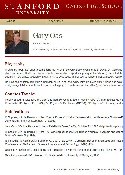On the abuse and use of relativistic mass
von Gary Oas
On the abuse and use of relativistic mass
Gary Oas
dated: Feb. 2, 2008 – Education Program for Gifted Youth, Stanford University – [USA]:
12 S. – URL: http://arxiv.org/pdf/physics/0504110v2.pdf
Aufgenommen von der Forschungsgruppe G.O. Mueller in der Ergänzung des Kapitels 4 der Dokumentationen des GOM-Projekts: 2394 weitere kritische Veröffentlichungen:
The concept of velocity dependent mass, relativistic mass, is examined and is found to be inconsistent with the geometrical formulation of special relativity. This is not a novel result; however, many continue to use this concept and some have even attempted to establish it as the basis for special relativity. It is argued that the oft-held view that formulations of relativity with and without relativistic mass are equivalent is incorrect. Left as a heuristic device a preliminary study of firsttime learners suggest that misconceptions can develop when the concept is introduced without basis. In order to gauge the extent and nature of the use of relativistic mass a survey of the literature on relativity has been undertaken. The varied and at times self-contradicting use of this concept points to the lack of clear consensus on the formulation of relativity. As geometry lies at the heart of all modern representations of relativity, it is urged, once again, that the use of the concept at all levels be abandoned.
I. INTRODUCTION
The year 2005 has been deemed the “World Year of Physics” in conjunction with the 100th anniversary of Einstein’s “Annus Mirabilis.” As a result, numerous discussions of Einstein’s achievements will ensue throughout the year. There will, no doubt, be numerous presentations of the theory of relativity and quantum mechanics in newsprint, books, and on television. It is the responsibility of physicists to educate the lay-public about these ideas and their importance to society. However, it behoves the physics community to insure that such presentations are free of inaccuracies and hyperbole. Action must be taken when broad, inaccurate assertions are put forth (such as stating everything is random in quantum mechanics, or that Einstein did not believe in quantum mechanics[1]).
- 20. Januar 2013
- Artikel
